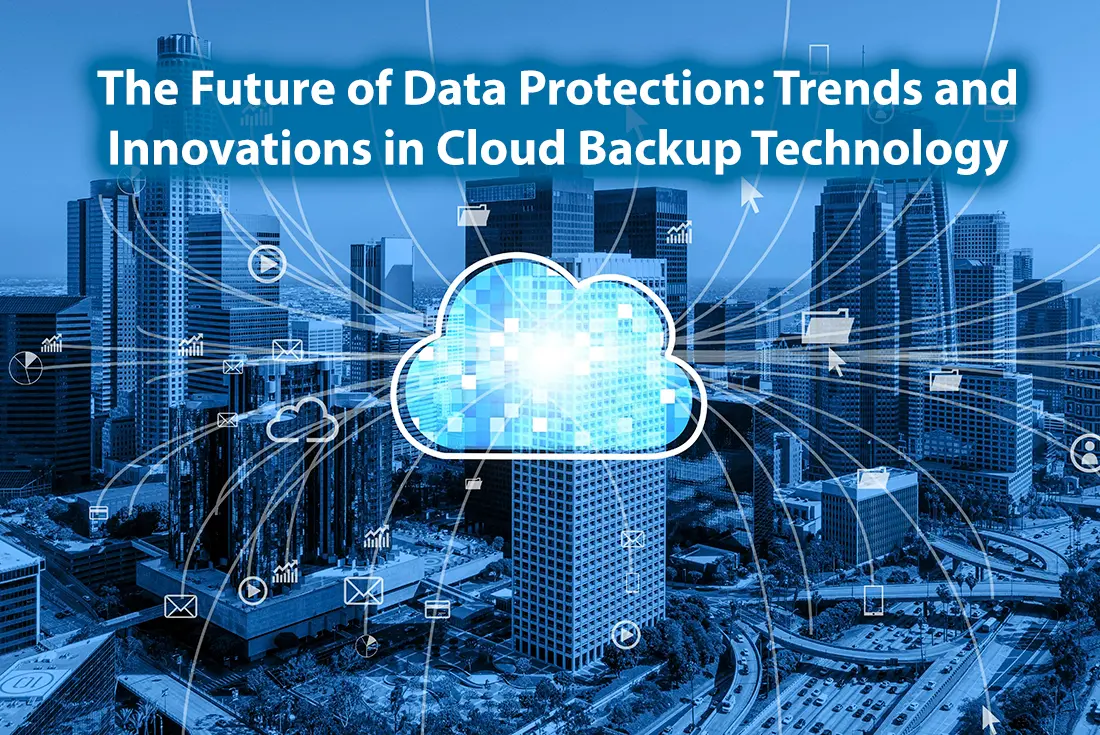
17 May The Future of Data Protection: Trends and Innovations in Cloud Backup Technology
Data has become the lifeblood of businesses and individuals in the digital age. From customer records and financial transactions to intellectual property and personal memories, our digital assets are invaluable. However, this reliance on data also exposes us to unprecedented risks, as cyberattacks, hardware failures, and natural disasters can lead to catastrophic data loss. Cloud backup has emerged as a critical defense mechanism, providing a secure and scalable way to protect data from these threats.
Today, the cloud backup landscape is undergoing a profound transformation, driven by emerging technologies that promise to revolutionize data protection. Artificial intelligence, machine learning, edge computing, blockchain technology, and serverless architectures are converging to create a new generation of cloud backup solutions that are more secure, efficient, and resilient than ever before.
In this article, we will delve into the current state of cloud backup, exploring its benefits, challenges, and the key players in the market. We will then examine the emerging trends that are shaping the future of data protection. Finally, we will discuss the impact of these advancements on businesses and consumers, as well as the challenges and opportunities that lie ahead in the realm of cloud storage services. Join us as we embark on a journey into the future of data protection, where cloud backup technology is poised to play a pivotal role.
Current Landscape of Cloud Backup
Cloud backup has become an indispensable tool for businesses of all sizes. Major providers like Amazon Web Services (AWS), Microsoft Azure, Google Cloud Platform (GCP), and specialized backup vendors offer diverse solutions with varying storage tiers, backup frequency, and recovery options.
These cloud storage services leverage advanced technologies such as deduplication, compression, and incremental backups to optimize storage efficiency and reduce costs. Businesses benefit from the scalability and flexibility of cloud backup, allowing them to easily adapt to changing data volumes and business needs. Additionally, cloud backup enables seamless disaster recovery, ensuring business continuity in the face of unexpected events.
However, current cloud backup solutions are not without challenges. Data security remains a top concern, as the increasing sophistication of cyberattacks demands robust encryption and security protocols. Additionally, reliance on internet connectivity for backups and restores can pose limitations, especially for organizations with large datasets or unreliable network infrastructure. These challenges underscore the need for ongoing innovation in cloud backup technology, pushing providers to offer the best cloud backup solutions possible. Let’s take a look at emerging technologies that promise to revolutionize data protection.
Don’t leave your critical data vulnerable to cyberattacks, hardware failures, or natural disasters. Downtown Computer Services offers the best cloud backup solutions in Fort Lauderdale! Contact us today at (954) 524 9002 for a free consultation and take the first step towards a more secure and resilient digital future.
Enhanced Security Measures
Zero-trust architectures are gaining traction in cloud backup as traditional perimeter-based security models prove inadequate against sophisticated cyber threats. In a zero-trust environment, every user, device, and application must continuously authenticate and authorize before gaining access to resources. This approach minimizes the attack surface and reduces the risk of lateral movement within the network.
Robust encryption algorithms, such as AES-256, are employed to safeguard data both at rest in storage and in transit over networks. The implementation of multi-factor authentication (MFA), where users must provide multiple credentials for verification, further strengthens security by thwarting unauthorized access attempts. Role-based access controls (RBAC) ensure that users have access only to the data and resources necessary for their specific roles, limiting the potential impact of a security breach.
Artificial Intelligence (AI) and Machine Learning (ML) Integration
AI and ML are increasingly important in cloud backup, enabling proactive threat detection and intelligent resource management. AI-powered anomaly detection algorithms analyze backup patterns and behaviors, identifying deviations that may indicate a cyberattack, data corruption, or unauthorized access. By flagging these anomalies in real time, organizations can take swift action to mitigate risks and prevent data loss. ML models are employed to optimize backup schedules and resource allocation, considering factors such as data growth rates, network bandwidth availability, and storage costs. This intelligent optimization ensures that backups are performed efficiently while minimizing resource consumption and costs.
Edge Computing Integration
Edge computing is revolutionizing cloud backup services by bringing processing power closer to data sources, reducing latency and accelerating backup and restore operations. Edge devices, such as local servers or IoT gateways, can perform initial data processing and deduplication, reducing the amount of data that needs to be transferred to the cloud. This approach significantly improves backup speed, especially for organizations with large datasets or limited network bandwidth. Edge computing also enables localized data analysis, providing real-time insights into backup performance, data integrity, and potential security threats.
Blockchain Technology Adoption
Blockchain, the distributed ledger technology known for its immutability and transparency, is emerging as a powerful tool for enhancing cloud backup integrity and security. By recording backup transactions on the blockchain, organizations can create tamper-proof audit trails, ensuring the authenticity and integrity of backup data. Any unauthorized modifications or deletions would be immediately apparent, as they would disrupt the cryptographic chain linking the blocks in the blockchain.
Decentralized storage based on blockchain technology distributes backup data across multiple nodes, enhancing data resilience and availability even in the face of hardware failures or cyberattacks. Smart contracts, self-executing agreements stored on the blockchain, can automate backup verification and recovery processes, ensuring compliance with predefined policies and procedures.
Serverless Backup Architectures
Serverless computing, a cloud-native model that abstracts away infrastructure management, is transforming cloud backup services. In a serverless architecture, organizations no longer need to provision and manage servers for backup tasks. Instead, they can leverage serverless functions, which are small, event-driven code snippets that automatically execute in response to specific triggers.
This approach eliminates the need for upfront infrastructure investments, reduces operational overhead, and enables dynamic scaling to meet fluctuating backup demands. Pay-as-you-go pricing models align costs with actual usage, providing cost efficiency and flexibility for the best cloud backup solutions.
The Impact on Businesses and Consumers
The evolution of cloud backup technology is poised to profoundly impact both businesses and consumers. For businesses, these advancements translate into enhanced data protection, greater operational efficiency, and improved resilience against cyber threats.
Enhanced Data Protection
Advanced security measures, such as zero-trust architectures and AI-powered anomaly detection, significantly reduce the risk of data breaches and unauthorized access. The integration of blockchain technology ensures the immutability and verifiability of backup data, providing an additional layer of protection against tampering or manipulation.
Greater Operational Efficiency
AI and ML optimization streamline backup processes, ensuring that backups are performed efficiently and cost-effectively. Edge computing reduces latency and accelerates backups and restores, minimizing downtime and maximizing business continuity. Serverless architectures eliminate the need for manual infrastructure management, freeing up IT resources for other strategic initiatives.
Improved Resilience
The integration of edge computing and decentralized storage based on blockchain technology enhances data resilience, ensuring that backups are available even in the face of hardware failures or cyberattacks. This improved resilience translates into greater business continuity and faster recovery times in the event of a data loss incident.
For consumers, the advancements in cloud backup technology offer enhanced privacy and greater control over personal data. Strong encryption algorithms and multi-factor authentication protect sensitive information from unauthorized access. Blockchain-based solutions provide transparency and auditability, allowing consumers to verify the integrity of their backed-up data.
However, the adoption of these emerging technologies also presents challenges. Businesses must carefully evaluate the costs and complexities associated with implementing new cloud backup solutions. Regulatory compliance remains a critical concern, as data protection laws and regulations continue to evolve. Consumers may face challenges in understanding and managing their data backups, requiring clear communication and user-friendly interfaces from cloud backup providers.
Conclusion
The future of data protection is inextricably linked to the ongoing evolution of cloud backup technology. Emerging trends like enhanced security measures, AI and ML integration, edge computing, blockchain adoption, and serverless architectures are reshaping the landscape, empowering organizations with advanced tools and capabilities to safeguard their critical data assets.
As these trends continue to mature and converge, we expect to see even more innovative solutions that will further enhance data protection, improve operational efficiency, and reduce costs. The integration of AI and ML will enable proactive threat detection, predictive analytics, and intelligent resource management. Edge computing will accelerate backups and restores, while blockchain technology will ensure data integrity and immutability. Serverless architectures will streamline operations and reduce infrastructure complexity.
However, the adoption of these emerging technologies will not be without challenges. Organizations must carefully evaluate the costs and complexities associated with implementing new cloud backup solutions. Regulatory compliance will remain a critical concern, as data protection laws and regulations evolve. Ensuring the security and privacy of sensitive data will require ongoing vigilance and robust security practices.
Small business owners can safeguard their valuable data and gain peace of mind with expert guidance from Downtown Computer Services. We understand the unique challenges small businesses face in protecting their digital assets. Call today at (954) 524 9002 for a free consultation on cloud backup.
Three Takeaways
- Emerging technologies like AI, blockchain, and edge computing are transforming cloud backup, enhancing security and efficiency.
- These advancements offer businesses better data protection, operational efficiency, and resilience against cyber threats.
- Challenges like implementation costs, regulatory compliance, and data privacy need to be addressed for widespread adoption.
Check out other relevant news
- How Easy-to-Use Hacking Tools Are Fueling Cybercrime
- Cryptocurrency Security for Small Businesses: Protecting Your Wallet
- The Infostealer Epidemic: Protecting Your Business from the Latest Wave of Cyberattacks
- The Identity Crisis: How Compromised Credentials Can Cripple Your Business
- Beyond the Brick and Mortar: Building Your Online Storefront with Digital Marketing
